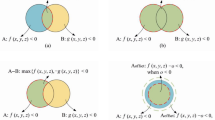Abstract
Rapid prototyping technology makes the manufacturing of functionally graded material (FGM) objects possible. The FGM production process requires concurrent applications of digital design and manufacturing methods. For this reason, it is imperative to construct and capture information and other critical data regarding the geometry and materials about FGM objects for use in the manufacturing process. This paper proposes a simplex-clear data format for modeling FGM objects. This proposed data format captures both the geometry and material information of an FGM object. It also presents a finite element-based slicing algorithm which slices the FGM object into layers and captures each layer’s information for rapid prototyping manufacturing of the object. An example is given at the end of the paper to validate the data format and demonstrate the adaptive slicing algorithm.
Similar content being viewed by others
References
Jie N (2003) Study of functionally graded material and evaluation of their performance. J Shanxi Inst Technol 6(2):4–7
Chua CK, Sudarmadji N, Leong KF (2009) Process flow for designing functionally graded tissue engineering scaffolds. The 4th International Conference on Advanced Research in Virtual and Rapid Prototyping, Leiria, Portugal 10(6–10), pp 45–49
Leong KF, Chua CK, Sudarmadji N, Yeong WY (2008) Engineering functionally-graded tissue engineering scaffolds. J Mech Behav Biomed Mater 1(2):140–152
Chua CK, Leong KF, Lim CS (2009) Rapid prototyping: principles and applications, 3rd edn. World Scientific, Singapore
Sihn KH, Dutta D (2002) Process-planning for layer manufacturing of heterogeneous objects using direct mental deposition. J Comput Inf Sci Eng 2:330–344
Wu Y, Li A-P, Zhang S (2005) New development of 3D printing technique. J Mach Manuf 43(12):62–64
Srinivas B, Ki HS, Dutta D (2000) An integrated CAD system for design of heterogeneous objects. Rapid Prototyping J 6(2):119–135
Siu YK, Tan ST (2002) Source-based heterogeneous solid modeling. Comput-Aided Des 34(1):41–55
Kumar V, Kulkani P, Dutta D (1999) Adaptive slicing of heterogeneous solid models for layered manufacturing. J Mater Process Manuf Sci 7(4):324–342
Wu H et al. (2000) Distributed design and fabrication of parts with local composition control. Proceedings of the 2000 NSF Design and Manufacturing Grantees Conference, Vancouver, BC, Canada
Zhu W, Yu K (2001) Dexel-based direct slicing of multi-material assemblies. Int J Adv Manuf Technol 18(4):285–302
Xu DM, Jia ZY, Guo DM (2005) Direct and adaptive slicing on CAD model of ideal functional material components (IFMC). China Mech Eng 18(1):139–144
Zhou MY (2004) Adaptive slicing of functionally graded material objects for rapid prototyping. Int J Adv Manuf Technol 24(6):345–352
Wang S, Zhu Y, Chen N (2007) Adaptive slicing algorithm for rapid prototyping manufacturing of functionally graded material component. J Jilin Univ (Eng Technol Ed) 37(3):558–562
Author information
Authors and Affiliations
Corresponding author
Rights and permissions
About this article
Cite this article
Wang, S., Wang, Y., Chen, CS. et al. An adaptive slicing algorithm and data format for functionally graded material objects. Int J Adv Manuf Technol 65, 251–258 (2013). https://doi.org/10.1007/s00170-012-4164-6
Received:
Accepted:
Published:
Issue Date:
DOI: https://doi.org/10.1007/s00170-012-4164-6




